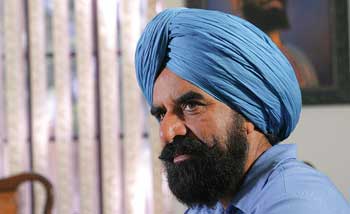![[Metroactive Movies]](/movies/gifs/movies468.gif)
[ Movies Index | Show Times | Silicon Valley | Metroactive Home | Archives ]
Precious Mettle
A Sikh taxi driver in America fights prejudice in director Kavi Raz's Cinequest feature 'The Gold Bracelet'
By Richard von Busack
IT MUST be a trick of fate that the Sikhs, some of the bravest soldiers in history, ended up in the highly perilous job of urban taxi driving. At the beginning of Kavi Raz's The Gold Bracelet, a Sikh cabby is shot—a senseless, wrong-time, wrong-place death staged with maximum surprise and probability.
After the funeral, a pregnant survivor (his niece) walks on the beach, mulling over the hardships of America, and vows that the child in her belly will be named after the dead man.
Raz cuts from this scene, and we never do see the baby. The director sharply changes the mood, taking us to the interior of a gas station, where a Sikh mechanic, Arjun Singh (Raz), faces down a friendly white customer who keeps calling him "A-Rab."
Rarely do movies show us how patronization can be mixed with praise, leaving the recipient not knowing how to react. The Gold Bracelet does this well and consistently. When his neighbors fix Singh and his family with hate stares, or when they alarm him with coarse talk, we see what it is like to be an outsider.
But Raz emphasizes the earthier side of life. This is a prosperous family, based somewhere in the San Fernando Valley. And until the end—where the story spins a little out of control—Raz seems to be working toward a uniquely Eastern slice of Americana, closer in tone to Meet Me in St. Louis than to a TV sitcom.
Raz, who appeared on TV's St. Elsewhere, has a sensual, humorous face. As a director, he doesn't ram home the ironies of being a man of two worlds. It appears natural that, lounging around home, Singh wears both his turban and a T-shirt reading "Dad's Lucky Fishing Shirt."
The title bracelet symbolizes this man of both worlds: it is a valuable piece of gold that will be divided into halves as a wedding present. Raz is compelling enough as an actor that he can make what are often rough transitions work. (Not always, though; in the worst transition, a moment of bliss bashes into the middle of an argument between Singh and his brother.)
Yet Raz's Singh gives a sense of a man of many parts, who has learned to have a balanced life. In the night, Singh tries to corner his wife, twirling his mustache when she gently wriggles out of his grasp; the scene is followed directly by morning prayers. At times, talking to his God, or dancing a little with happiness, Raz reminds one of the warmth of Topol in Fiddler on the Roof.
The Gold Bracelet follows the well-worn trail of the assimilation movie. As always, the daughter is slightly more headstrong than she should be, and the son is slightly softer in the head than he ought to be. For a time, the movie turns on the question of whether the far-too-sure-of-herself daughter, Simrun (Meheruninisa Hassan), will settle for an arranged marriage or instead go for the unturbaned Muslim college boy she loves. (He is called "Bobby Dhillon.")
When the story follows the courtship of the two young lovers, Raz includes a Bollywood-style showstopper. He stages it on the quad at Cal State Northridge, with a rainbow-colored demographic as the chorus. The commuter school never looked better, thanks to photographer Jack Conroy of My Left Foot.
First-time director though he is, Raz is concerned with surfaces—the drape of a hot pink sari whirling before the camera, the fiesta of color in a South Asian jewelry store and the lusciousness of a plate of samosas dripping with emerald chile sauce.
And then 9/11 enters the scene, changing every aspect of life: "America has lost its innocence." Unfortunately, that's an actual line of dialogue. The Gold Bracelet, which starts out with a senseless death, ends with a second act of violence.
Director Raz runs over this finale fast, suggesting that his concentration was more on getting the musical scene right and less on wrapping up the story. The violent incident is based on a true story, as the film's website is quick to insist. More than one American Sikh was attacked by patriotic boneheads who thought they were avenging the World Trade Center. My objection is not that the material is unlikely, but that Raz's direction seems both heavy-handed and slapped together. Material for two movies merges here.
In any case, The Gold Bracelet is one of the most rewarding movies at this year's Cinequest. I recommend the film for the rapport between Raz and the actress playing his wife, the shrewd yet lovely Archana Puran Singh. Even Raz's decision to leave a few snatches of dialogue untranslated works well: there is a certain pleasure in guessing the context of what a person is saying from their face and voice. The Gold Bracelet has the sense of a movie that changed as it was made. Still, Raz demonstrates enough skill and heart that the sudden changes don't really matter.
[ Silicon Valley | Metroactive Home | Archives ]
Copyright © 2006 Metro Publishing Inc. Metroactive is affiliated with the Boulevards Network.
For more information about the San Jose/Silicon Valley area, visit sanjose.com.
![]()

Driving Ambition: Director Kavi Raz also stars in his film 'The Gold Bracelet.'
The Gold Bracelet (Unrated; 140 min.), written and directed by Kavi Raz, photographed by Jack Conroy and starring Kavi Raz and Archana Puran Singh, plays March 11 at 8:30pm and March 12 at 12:30pm at the California Theatre.
Send a letter to the editor about this story to letters@metronews.com.
From the March 8-14, 2006 issue of Metro, Silicon Valley's Weekly Newspaper.